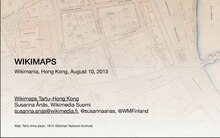GLAM-WIKI 2015/Programme/Introductions/Maptime

Galleries, Libraries, Archives, Museums & Wikimedia / Fri 10 - Sun 12 April 2015 | ||||||||
| Info & News | Registration | Programme | For speakers | Accommodation | Travel | The Hague | Challenge | Credits & Thanks |
Etherpad: https://etherpad.wikimedia.org/p/glamwiki15-maptime
Maptime @ GLAM-WIKI - Beginners very welcome!

Making your own map has never been easier! How? Bring your laptop, come to Maptime @ GLAM-WIKI and join us for a hands-on session to create maps together. Bring your favorite map to share it with us!
We will work on maps, learn about geospatial and historical data and teach each other the latest cartographic tools.
The Wikimaps project was created to make available historical maps from archives in Wikimedia Commons and to bring together tools to work with them. With this workshop it joins Maptime in exploring historical maps and locations in Wikimedia projects.
- Wikimaps - http://wikimaps.wikimedia.fi
- Wikimaps on Facebook - https://www.facebook.com/groups/wikimaps/
- Maptime Amsterdam - https://maptime-ams.github.io
Hosts
- Susanna Ånäs - Wikimedia Finland / Wikimaps
- Bert Spaan - Waag Society
Bert Spaan is initiator of Maptime Amsterdam and works as developer with Waag Society in Amsterdam.
Susanna Ånäs has initiated the Wikimaps project. She seeks for ways to make working with historical maps and locations more accessible to hobbyists and experts alike.
More info
Although working with Geo/Gis applications is getting easier every day thanks to open data and easy to use web tools for many people designing and making maps is still difficult and hard. Maptime started as an idea at the 2013 State of the Map US conference, spread rapidly to other cities and developed into a global phenomenon aimed at opening the doors of cartographic possibility to anyone interested. The Maptime learning network started out as a response to realizing how expert-oriented mapping environments are, and how diversity had been missing from them. Inspiration for Maptime comes from both hack nights and knitting circles. Both are models of spaces for people to create and learn together.
The Wikimaps project was created to bring tools to Wikimedia projects to work with historical maps and locations. The goal is to bring maps from the archives to Wikimedia Commons, straighten them in present day coordinates and extract historical information from them. The work to create an online maker space for these tools is ongoing. With this workshop the Wikimaps project joins Maptime in exploring maps in Wikimedia projects. Maptime sessions take many forms. A common approach is to learn tools, but the time for maps can be spent on learning about cartography or working with one’s own projects. In the workshop we will see how maps could be used inside Wikimedia projects, try hands-on web mapping tools or see how information from the Wikimedia projects can inform maps.
Maptime is hands-on, so don't forget to bring your laptop! All skill levels are welcome.
Technologies that will be presented and discussed include:
- Wikimaps Warper: https://warper.wmflabs.org/ An open source map georectifier that has been made to function easily with Wikimedia Commons. A historical map can be made to match the present day coordinates. Rectified maps can then be further utilized in other environments, such as OpenHistoricalMap, the OpenStreetMap for historical maps.
- Histograph: A geocoder that links historical place names (toponyms, anything between an address and a country) amongst themselves and with modern day place names. It enables searching Cultural Heritage for geolocations and making complex visualisations of the results on maps and much more. Histograph is a work-in-progress and a result of the Dutch project Heritage and Location (Erfgoed & Locatie). Very preliminary documentation is available at https://histograph.github.io/ and https://histograph.io/.
